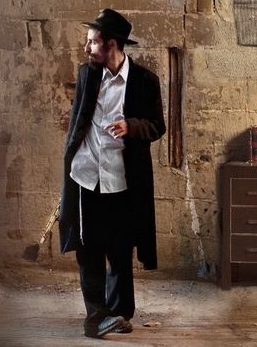 Tzadik
TzadikDaniel Zamir, whose first three CDs for Tzadik contain some of the most passionate and sophisticated blending of Jewish Music and Jazz ever recorded returns to Tzadik after a five-year hiatus in Israel to present his complex musical vision with a dynamic new quartet. Joined by three of the most exciting musicians in the New York Jazz scene, pianist Uri Caine, bassist Greg Cohen and percussionist extraordinaire Joey Baron, Zamir's music takes on a more mature and spiritual quality. This is New Jewish instrumental music at its very best.
CreditsJoey Baron: Drums
Uri Caine: Piano
Greg Cohen: Bass
Daniel Zamir: Soprano Saxophone
Joslyn LayneAlto saxophonist Danny Zamir plays modern jazz that draws as much from klezmer as it does from Ornette Coleman. Born circa 1980 in Tel Aviv, Israel, Zamir was drawn to the sound of the saxophone at a young age and began studying the instrument at the age of 12. Hearing Charlie Parker for the first time had a great effect upon him, and from that point on, he focused on music studies. Zamir attended a Tel Aviv high school that specialized in the arts and offered an intensive music program. In addition to the music of Charlie Parker, some of Zamir's early influences include Eric Dolphy, John Coltrane, Ornette Coleman, and Pat Metheny. Zamir formed a trio called Not for Sale and eventually started listening to other musicians, as well. Of those he heard, Zamir was most impressed with saxophonist and experimenter John Zorn. In late 1998, he relocated to N.Y.C., where he met percussionist Kevin Zubek and bassist Shanir Ezra Blumenkranz, with whom he formed SATLAH, as well as well-known N.Y.C. musicians including Zorn. Zamir has also worked occasionally with members of the downtown scene, including Jamaaladeen Tacuma, Marc Ribot, and Calvin Weston. SATLAH's recorded debut includes a guest appearance by Zorn and was released in March 2000 on the Tzadik label. Zamir followed it with I Believe, also on the Tzadik imprint, in 2008.
Warren AllenSince he first appeared in New York as a wildly blowing teenage alto saxophonist, Daniel Zamir has toned down just a little. An Israeli who grew closer to his Judaism while abroad, he has since returned to the Holy Land, and these days, plays exclusively soprano sax. I Believe, an American release, shows a fiery but refined player, capable of blending religious melodies with high octane jazz.
The album features as talented and sympathetic a rhythm section as Zamir could hope for in Greg Cohen, Joey Baron and Uri Caine. All have worked on a variety of Jewish-jazz fusion projects before, and Caine's pensive piano work provides the perfect contrast to the leader's tone. His solo on "Poem 51/52" matches the saxophonist's explosive sound by building a rhythmic statement from the ground up and expanding the limits of melody.
For his part, Zamir flies all over the grooving "Poem 54 (770)." He locks into hypnotic repetitions, reaches through the full range of his horn, and calls out with a variety of vocal inflections. Later, his warm interpretation and intense technique combine for the swirling "Let Me in Under Your Wing." The music is not so much played as intoned, as the saxophone leads the group in prayer.
With its bouncing Rasta beat, "Poem 10" echoes Zamir's playing alongside Reggae icon Matisyahu. Save for a great piano solo though, its novelty wears out over eight and a half minutes. By contrast, the lone saxophone's "You Are My G-d" is short and lyrical, never losing focus.
"The Fifth Letter in the Hebrew Alphabet" opens with sax and piano dueting gently, building as bass and drums enter, before giving way to a Zamir solo that sears the soul. Long strings of notes and soulful cries, answered by the rhythm section; create the sense of an impassioned High Holiday service. "Nine Minute (or so) Chabad Nigun" also begins quietly, but keeps gaining steam through modal changes and a tight piano solo, until Zamir again tears through with an ecstatic melodic statement.
"I Believe" provides a heartfelt coda to the album, built off the warm interplay between sax and piano. At once a statement of the leader's faith, the song also reflects the kind of devotion that drives the best musicians. Zamir's religious conviction gives him an intensity that many virtuoso players never capture, and provides as deep a well for emotional expression as any artist could need. He means to touch the soul here, and succeeds.

